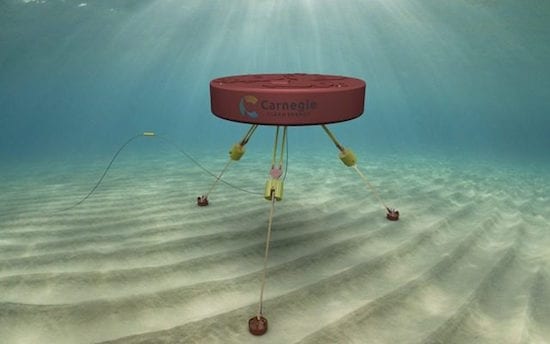Embattled renewables developer Carnegie Clean Energy has gone into voluntary administration, the ASX-listed company announcing on Friday that it had appointed KordaMentha Restructuring to oversee the business and its fully owned subsidiary, Energy Made Clean.
“The administrators are in discussions with key stakeholders to secure funding to allow the company to continue to trade whilst the administrators pursue a recapitalisation,” a statement on the company’s ASX website said.
“A further update in respect of the funding arrangements and potential recapitalisation proposal will be released to the market in the coming days.”
The not entirely unexpected development comes just days after the the Western Australian government terminated a $16 million contract it had signed with Carnegie to build a wave farm off the coast of Albany.
The proposed 20MW Albany wave project, which was promised a total of $19.5 million in state government funding ahead of the March 2017 WA election, was to use Carnegie’s CETO 6 technology – considered among the most advanced in the world – to tap what it said was one of the most consistent wave power resources in the world.
According to WA regional development minister Alannah MacTiernan, who delivered the news of the contract termination on Tuesday, the “unexpected proposal to change Federal R&D tax concessions created an environment of uncertainty that destabilised the company’s finances.”
On top of that, the company’s shares had been taking a hammering over what proved to be a disastrous foray into the solar and micro-grid business – clearly paying way too much for Energy Made Clean.
At the start of March the company’s shares were suspended after Carnegie failed to produce its accounts on time, and then revealed a bottom line loss of $45 million as it took write downs on the value of its CETO wave technology, and its solar micro-grid business.
Western Australia’s McGowan government wasn’t alone in its financial backing of Carnegie. The Australian Renewable Energy Agency and the Clean Energy Finance Corporation both put their money on the Perth company’s wave technology – around $40 million from ARENA and $20 million in loans from the CEFC.
Western Australia’s previous Coalition Barnett government also supports the company, with a $12.5 million grant for its pilot project off Garden Island.
Carnegie has not commented on the voluntary administration, other than to announce it, but on Tuesday said it was “disappointed” with the W.A. government’s decision to pull out of the Albany project, which it had outlined plans to deliver over an extended timeline and with a reduced budget.
The company also said the additional time would have allowed it to incorporate a number of design innovations into the CETO unit to be deployed in Albany that would have reduced the project’s capital cost, and the levelised cost of energy.
“Albany remains one of the most attractive worldwide sites to demonstrate and ultimately exploit the potential of wave energy,” Carnegie said on Tuesday.





